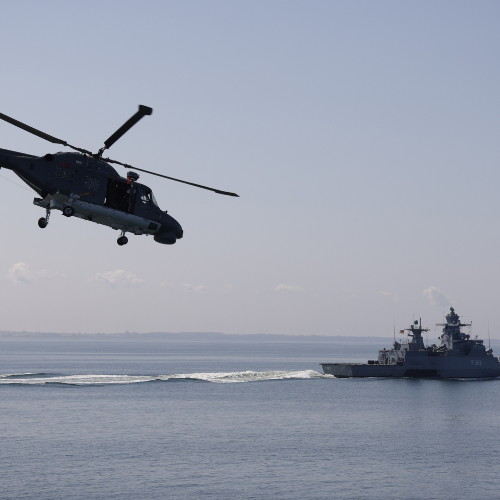A recent incident over the Baltic Sea has raised alarms and sparked fears of a larger conflict, as a Russian warship fired at a German military helicopter. The situation is fueling concerns about escalating tensions between Russia and NATO countries, which have been on the rise in recent months.
A Dangerous Moment in the Baltic Sea
The conflict began when a German army helicopter was conducting a reconnaissance flight over the Baltic Sea. The helicopter, part of Germany’s military operations, was gathering information in the region. However, the flight took a dangerous turn when a Russian warship opened fire on the helicopter.
The Russian crew used signal ammunition, a type of non-lethal projectile, to fire at the German aircraft. Signal ammunition is typically reserved for emergency situations, signaling to other ships or aircraft. This action raised immediate concerns because it is unusual for military forces to fire on each other in such a manner, especially when the ammunition used is typically not intended to harm but to alert or communicate.
Although the ammunition used was not meant to cause damage, the firing of any kind of weapon at a military aircraft during a reconnaissance mission is a serious event. The German Foreign Minister later confirmed the incident, although the exact date and time of the event were not disclosed. The firing of weapons, even non-lethal, raises questions about the intentions of the Russian military in the region.
Rising Tensions Between Russia and NATO
This incident is part of a larger pattern of rising tensions between Russia and NATO, particularly after the ongoing conflict in Ukraine. Russia has repeatedly warned that countries such as the UK and the US are becoming more involved in the war by supplying weapons, including missiles, to Ukraine. The Kremlin has expressed frustration over what it sees as Western nations directly engaging in the conflict.
Georgia Faces Sanctions: Baltic States Act Over Protest Suppression
The situation surrounding the German helicopter is not just a one-off event. It is part of a broader set of actions that have been escalating in recent months. In particular, there have been concerns over the security of undersea pipelines and data cables in the Baltic Sea. These important infrastructure systems have been the target of attacks, including recent damage to two fiber optic cables in the region.
The increasing militarization of the region has made many countries, including Germany, more cautious and vigilant. Germany has been reorganizing its military to prepare for any potential conflict, with Defense Minister emphasizing the need to ensure the military is ready for any situation, even war. The recent actions of the Russian military in the Baltic Sea have added to these concerns, highlighting the fragile nature of international relations in the area.
Escalating Security Threats in the Baltic Sea
The Baltic Sea has become a hotspot for security threats over the past few months. Russian military actions in the region, such as the reported jamming of GPS signals, have been causing disruption for aircraft and ships. The disruption of GPS signals is a form of electronic warfare that can cause significant problems for military operations. A similar incident took place earlier this year when a British plane had its GPS signals interfered with while flying near Russian territory.
Another concerning development in the region is the increased attention on undersea infrastructure, including pipelines and data cables that connect countries in the Baltic region. These systems are crucial for both energy supplies and communication, and any disruption to them could have serious consequences. Several countries have been investigating the cause of the recent damage to fiber optic cables, with some pointing to a Chinese vessel that was in the area at the time. The investigation into this potential link adds another layer of complexity to the already tense situation.
As tensions continue to rise, the incident with the German helicopter underscores how quickly a seemingly small event can escalate into a broader international issue. With military forces from both Russia and NATO countries operating in close proximity to each other, the risk of misunderstandings and conflicts remains high. The situation in the Baltic Sea serves as a reminder of how fragile global security can be, with every action and decision having the potential to influence the stability of international relations.


